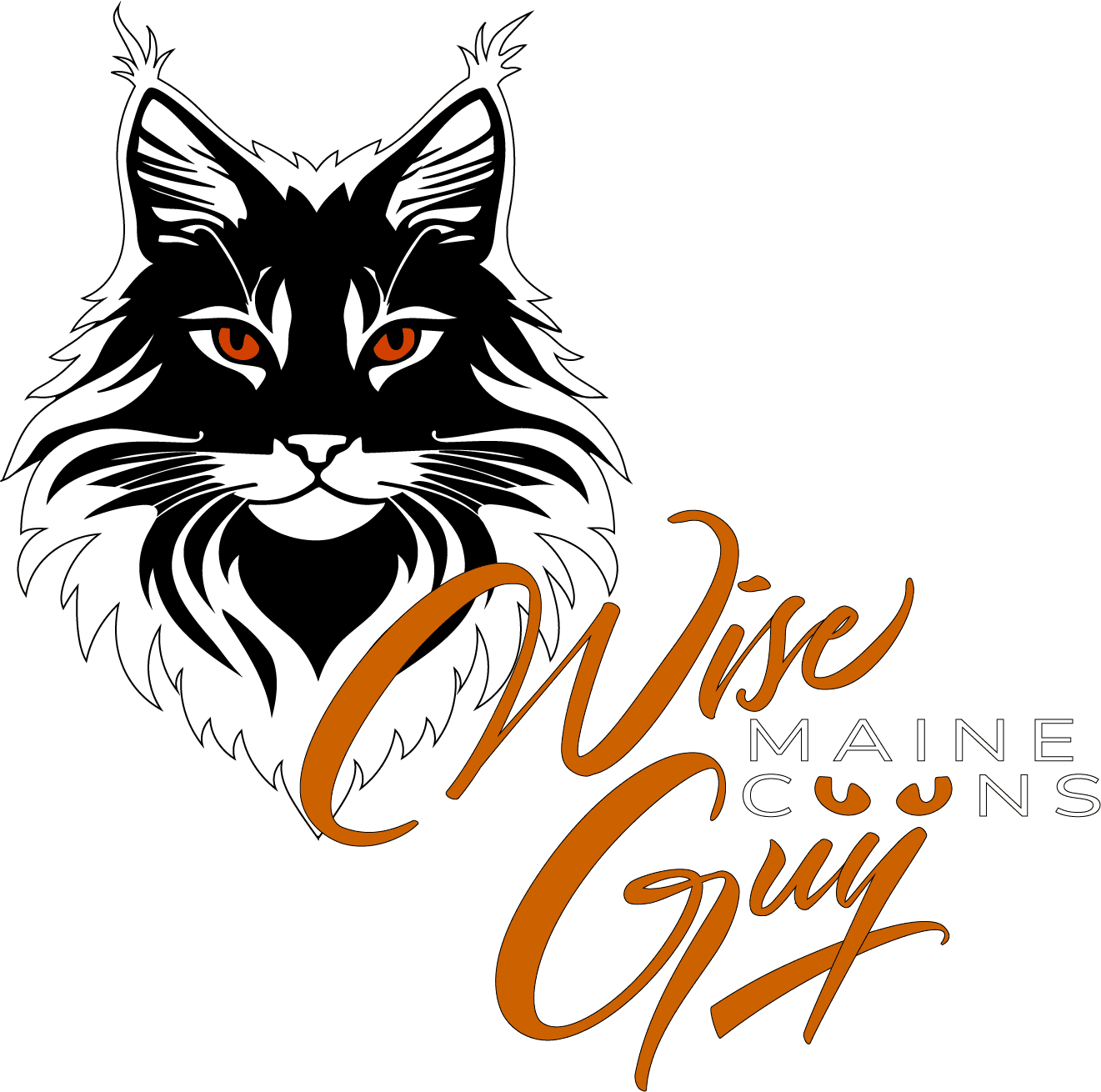Footsteps on the Trail
At WiseGuy Maine Coon Cattery, we are deeply committed to the health and well-being of our cats and kittens. Our dedication goes beyond providing a loving environment; we take proactive steps to ensure that each of our furry friends is in the best possible health. We conduct comprehensive genetic tests to screen for common hereditary conditions such as Hypertrophic Cardiomyopathy (HCM), Spinal Muscular Atrophy (SMA), Polycystic Kidney Disease (PKD1), and Pyruvate Kinase Deficiency (PKdef). These tests help us identify and manage any potential health issues early on, ensuring that our kittens grow up strong and healthy.
Pebbles Underfoot
To run our genetic tests, we use The Veterinary Genetics Laboratory (VGL) at the University of California, Davis. VGL is a non-profit, self-supporting unit within the School of Veterinary Medicine. Renowned for its highly accurate genetic testing services, VGL plays a crucial role in animal health by providing genetic diagnostics, parentage verification, and forensic services. The laboratory also contributes significantly to the educational and research missions of the school, advancing knowledge in veterinary genetics and supporting responsible breeding practices1. With a commitment to excellence, VGL helps breeders, veterinarians, and pet owners make informed decisions to improve animal health and welfare.
Each test we run check for the most common and even some, uncommon hereditary concerns connected with Maine Coon cats. They include:
Hypertrophic Cardiomyopathy (HCM) is the most common heart disease in cats, characterized by the abnormal thickening of the heart muscle, particularly the left ventricle. This thickening reduces the heart’s efficiency, leading to potential complications such as heart failure, blood clots, and sudden death. HCM is often a silent condition, showing no symptoms until it becomes severe. It is more prevalent in certain breeds, including Maine Coons, Ragdolls, and British Shorthairs, and is believed to have a genetic component. This genetic component is one of the things we test for here at WiseGuy Maine Coons.
Spinal Muscular Atrophy (SMA) is a genetic disorder primarily seen in Maine Coon cats, characterized by the progressive loss of motor neurons in the lower spinal cord, leading to muscle atrophy and instability. Affected kittens typically begin to show symptoms, such as an unsteady gait and posture abnormalities, around 3 to 4 months of age. While SMA is not painful or fatal, it does require special care to ensure the affected cats can live comfortably indoors. The condition is inherited in an autosomal recessive manner, meaning both parents must carry the gene for their offspring to be affected24. Responsible breeding practices, including genetic testing, are crucial in managing and reducing the incidence of SMA in Maine Coons.
Pyruvate Kinase Deficiency (PKdef) is a hereditary condition in cats that leads to hemolytic anemia due to a deficiency in the enzyme pyruvate kinase, which is crucial for red blood cell metabolism12. Without sufficient pyruvate kinase, red blood cells become unstable and have a significantly shorter lifespan, resulting in anemia. Symptoms of PKdef can vary from mild to severe and may include lethargy, pale gums, and an increased heart rate23. This condition is more commonly seen in certain breeds, such as Abyssinians, Somalis, and domestic shorthairs3. Genetic testing is essential for responsible breeding practices to prevent the spread of this disorder.
Polycystic Kidney Disease (PKD1) is a genetic disorder in cats, most commonly affecting Persian and Exotic Shorthair breeds. This condition is caused by a mutation in the PKD1 gene, inherited in an autosomal dominant manner, meaning only one parent needs to carry the gene for the offspring to be affected. PKD1 leads to the development of multiple fluid-filled cysts in the kidneys, which are present from birth and gradually enlarge over time4. These cysts can disrupt normal kidney function, often resulting in chronic kidney disease or renal failure as the cat ages. Early detection through genetic testing and regular veterinary check-ups can help manage the condition and improve the quality of life for affected cats.
Hidden Trail Not Taken
At WiseGuy Maine Coon Cattery we believe in checking for things not found by genetic tests, such as Hip Dysplasia. For that we use The Orthopedic Foundation for Animals. OFA is a non-profit organization dedicated to improving the health and welfare of companion animals through the reduction of genetic diseases. While originally focused on canine hip dysplasia, OFA has expanded its scope to include various inherited conditions in cats, such as hip dysplasia, heart disease, and thyroid disease. By maintaining comprehensive databases of genetic and health information, OFA provides valuable resources for breeders and veterinarians to make informed decisions and promote responsible breeding practices.
Hip dysplasia in cats is a hereditary condition where the hip joint develops abnormally, leading to a loose and unstable joint. This malformation causes the ball and socket of the hip to not align properly, resulting in discomfort, impaired mobility, and eventually arthritis. While it is more commonly associated with dogs, hip dysplasia can also affect cats, particularly larger breeds like Maine Coons and Himalayans. Symptoms may include limping, reluctance to jump, and decreased activity levels. Early diagnosis and treatment, which may involve pain management, weight control, and in severe cases, surgery, can significantly improve the quality of life for affected cats.
Not Every Trail can be Followed
Not everything can be tested for. Don't get me wrong. If I wanted to, I could go crazy and test for everything under the sun and keep my cats and kittens in a bubble where they never see the light of day or the gentle caress of a human hand, but that is not how we work here at WiseGuy Maine Coons. We believe in moderation. After all, cats really are outdoor animals that thrive in the wild with little intervention. So, while we don't condone cats being free outside without some level of supervision, we do understand that sunshine and playing outdoors with friends is healthy. Even if it is also risky. Life is risk, without it, there really isn't any point to living. We strive for a healthy balance of nature and nurture. Which is why we work closely with a Vet that shares our vision of healthy and happy furballs. In addition to our rigorous genetic testing, we proudly partner with Double Oak Veterinary Clinic. This collaboration allows us to provide top-notch veterinary care, including regular check-ups, vaccinations, and specialized treatments. The team at Double Oak Veterinary Clinic shares our passion for animal health and works closely with us to monitor, test, and maintain the well-being of all our cats and kittens.
Until Our Trail, Becomes Yours
Our goal is to ensure that every kitten from WiseGuy Maine Coon Cattery finds a loving home like yours where they can thrive and bring joy to their new families. By prioritizing health and temperament, we strive to give our customers the peace of mind that their new companion will lead a long, happy, and healthy life. Thank you for choosing to learn more about WiseGuy Maine Coon Cattery, where the care and love for our cats and kittens are at the heart of everything we do.
Our goal is to ensure that every kitten from WiseGuy Maine Coon Cattery finds a loving home like yours where they can thrive and bring joy to their new families. By prioritizing health and temperament, we strive to give our customers the peace of mind that their new companion will lead a long, happy, and healthy life. Thank you for choosing to learn more about WiseGuy Maine Coon Cattery, where the care and love for our cats and kittens are at the heart of everything we do.
If you would like to learn more about the medical conditions above, please check out these links.
Hypertrophic Cardiomyopathy (HCM) in Cats:
Cornell University College of Veterinary Medicine
Spinal Muscular Atrophy (SMA) in Cats:
Pyruvate Kinase Deficiency (PKdef) in Cats:
Polycystic Kidney Disease (PKD1) in Cats:
Veterinary Genetics Laboratory
Veterinary Genetics Laboratory (VGL) at UC Davis:
Orthopedic Foundation for Animals (OFA):





